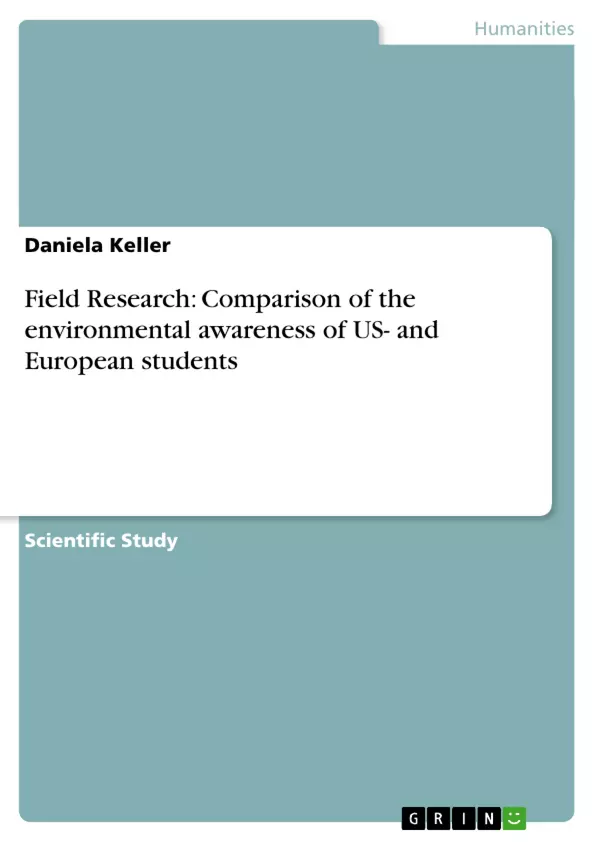Based on 14 qualitative guided interviews, U.S.-American and European students environmental awareness are investigated. The topics concentrated on in the interview guide were values connected with environmental protection and nature, concrete actions, awareness of real and possible consequences of pollution, the fear of them and sources of information. Students from the U.S. as well as from Europe value environmental protection. European students are more concerned about environmental protection and more negative about pollution. A higher concern of European students can especially be manifested when it comes to genetically modified food, of which American students don't have any fear at all. Both groups enjoy being in the nature, American students like camping, European ones like to take a walk or hike. Religion influences European students' values of environmental protection, but not American ones. European students consider recycling more self-evidently and are more likely to buy organic food. American students mention activities like not littering and planting trees, which European students don't mention. American and European students equal each other in terms of thinking that Europe is better in environmental protection than the U.S. and their environmental values having an effect on their voting behavior.
Inhaltsverzeichnis (Table of Contents)
- Outline of Problem: How much does environmental awareness depend on the society people live in? - A comparison between American and European students
- Interest in the topic
- Sociological importance of my project
- Questions asked and Conceptualization of the project
- Hidden hypothesis or biases at the beginning of the research
- Methods Used
- Research Design
- Methodological Reflections
- Findings
- Questions guide
Zielsetzung und Themenschwerpunkte (Objectives and Key Themes)
This field research aims to investigate the extent to which environmental awareness is influenced by the societal context in which individuals reside. The study focuses on comparing the environmental consciousness of American and European students, exploring potential differences and similarities in their perceptions, values, and actions.
- The influence of societal context on environmental awareness
- Comparison of environmental values and beliefs between American and European students
- The impact of social norms, media, and political discourse on environmental attitudes
- The role of personal experiences and individual values in shaping environmental behaviors
- Exploring potential discrepancies between stated values and actual environmental actions
Zusammenfassung der Kapitel (Chapter Summaries)
- Outline of Problem: This chapter introduces the research topic and outlines the author's personal interest in environmental awareness. It emphasizes the sociological importance of studying environmental attitudes in diverse societies and discusses the challenges associated with the subject, particularly the subjectivity of environmental facts. The chapter highlights the rationale for choosing American and European students as comparative groups and introduces the key research questions.
- Methods Used: This chapter outlines the research design and methodological considerations employed in the study. It discusses the theoretical frameworks informing the research and the rationale for selecting specific interview questions. It also provides insights into the challenges of conducting field research and the need to navigate personal biases and preconceptions.
Schlüsselwörter (Keywords)
The key terms and concepts central to this research include environmental awareness, societal context, comparative analysis, values, beliefs, actions, social norms, media, political discourse, and environmental behaviors.
Frequently Asked Questions
How does environmental awareness differ between US and European students?
European students tend to be more concerned about pollution and negative environmental consequences, particularly regarding genetically modified food.
What role does religion play in environmental values?
The study found that religion influences the environmental protection values of European students, but not those of American students.
How do students from both regions view recycling and organic food?
European students consider recycling more self-evident and are more likely to purchase organic food than their American counterparts.
What are typical outdoor activities for each group?
While both enjoy nature, American students prefer camping, whereas European students are more inclined toward walking or hiking.
Do environmental values affect political behavior in these groups?
Yes, students in both groups stated that their environmental values have an impact on their voting behavior.
- Quote paper
- Daniela Keller (Author), 2004, Field Research: Comparison of the environmental awareness of US- and European students, Munich, GRIN Verlag, https://www.grin.com/document/37415



